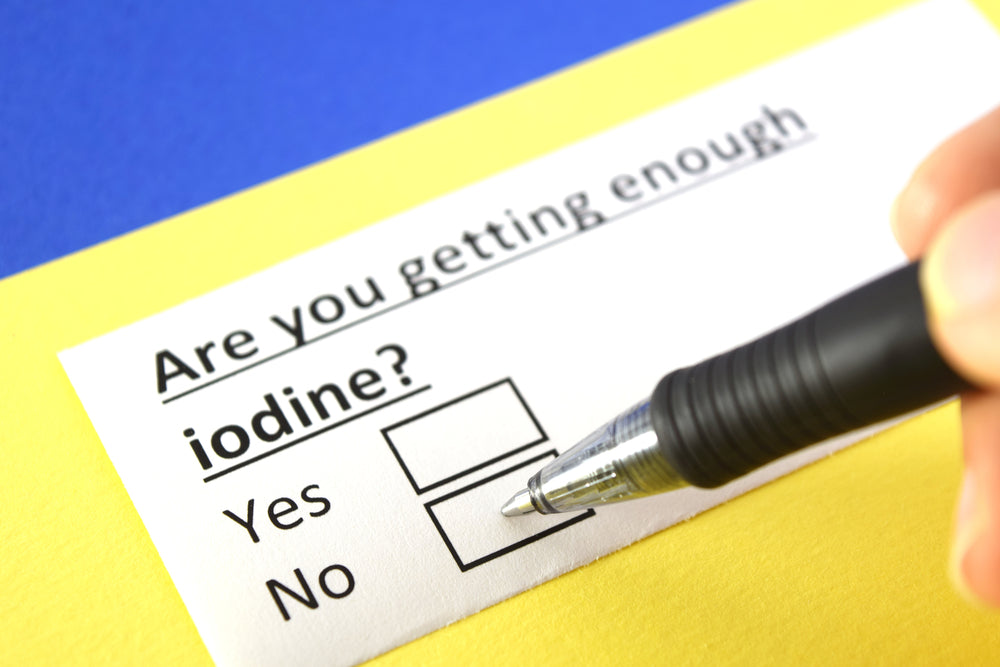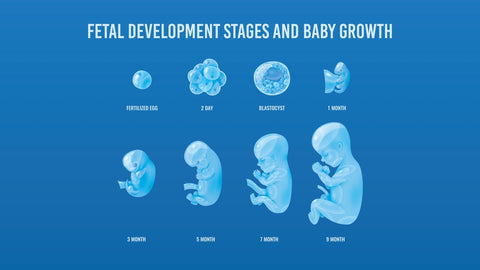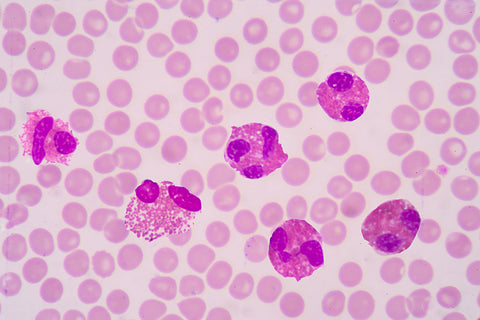Your cart is empty
Free shipping on all US orders


Free shipping on all orders

While you might think that micronutrients like iodine don't play a huge role in your daily health, you'd be surprised at how essential it is for functions ranging from thyroid regulation to cognitive wellness.
If you're unsure about how much iodine you need, the signs that you might not be getting enough, or where to find it, stick around.
Let's explore all you need to know about this vital micronutrient, ensuring you're reaping all its benefits.
Iodine has a fascinating history intertwined with the evolution of medical and nutritional science. Its discovery in 1811 by French chemist Bernard Courtois, amidst the ashes of seaweed, marked the beginning of a journey that would unveil the element's crucial role in human health. Initially investigated for its potential in medicine and industry, the significance of iodine for biological functions remained elusive until the late 19th and early 20th centuries.

The pivotal moment in understanding iodine's importance came through a series of scientific endeavors that linked the element to thyroid health.
Research in the late 1800s, particularly by Swiss physician Jean François Coindet, who reintroduced iodine in treating goiter, an enlargement of the thyroid gland, laid the groundwork for recognizing iodine's essentiality.
However, it was not until the early 20th century that extensive epidemiological studies established a definitive connection between iodine deficiency and goiter, along with other related disorders.
This period heralded a new understanding of micronutrients' roles in preventing disease, with iodine deficiency identified as the leading preventable cause of intellectual and developmental disabilities.
The subsequent introduction of iodized salt in the 1920s, aimed at combating iodine deficiency disorders on a population scale, epitomized the public health application of scientific research on iodine.
Today, the story of iodine serves as a testament to the enduring quest for knowledge and its profound impact on improving human health, showcasing the pivotal role of elemental research in unraveling the mysteries of nutrition and disease prevention.
This is why, it is of paramount importance to become familairized with iodine and all its benefits on human health. Ready? Let’s take a look at its most enduring benefits.
This is arguably the most noteworthy and wellknown benefit of iodine consumption.
See, your thyroid gland relies heavily on iodine to produce hormones critical for regulating metabolism, growth, and energy levels. This mineral plays a pivotal role in hormone synthesis, ensuring your body functions smoothly. Without adequate iodine, you might find yourself battling an array of health issues, ranging from sluggish metabolism to fluctuations in mood.

Iodine's importance in preventing thyroid cancer can't be overstated either. It helps maintain a healthy thyroid gland, reducing the risk of developing cancerous cells. This is crucial because your thyroid not only regulates your metabolism but also plays a key role in maintaining your overall health.
A well-functioning thyroid ensures you have the energy you need for your day-to-day activities, thanks to efficient hormone production fueled by iodine.
Iodine's overall impact on energy levels is significant as well. When your thyroid hormone levels are optimized, you're likely to experience a boost in energy. This is because these hormones help regulate how your body uses energy.
The synthesis of thyroid hormones, including thyroxine (T4) and triiodothyronine (T3), is directly influenced by the amount of iodine in the body. These hormones are integral to numerous bodily functions, influencing everything from heart rate to how quickly you burn calories. An imbalance in these hormones can lead to various health problems, including hypothyroidism, where the body doesn't produce enough thyroid hormone, leading to fatigue, weight gain, and feeling cold all the time.
The importance of iodine extends beyond its role in thyroid regulation; it is also crucial for maintaining cognitive function. The brain is one of the largest consumers of energy in the body, and its optimal functioning depends significantly on the proper regulation of thyroid hormones, which, as previously mentioned, are synthesized with the help of iodine.
The relationship between iodine, thyroid hormones, and cognitive abilities is intricate and underscores the necessity of iodine for brain health.
Cognitive function encompasses various mental abilities, including memory, attention, problem-solving, decision-making, and language comprehension. These processes enable us to perceive, understand, and respond to the world around us.
Research has shown that adequate iodine intake is vital for the development and maintenance of these cognitive functions. This is particularly evident during the early stages of life.
This is why iodine deficiency during pregnancy can lead to cretinism in infants, a condition characterized by severe mental retardation and physical deformities. Even mild iodine deficiency during this critical period can have long-lasting effects on the cognitive development of children, highlighting the importance of adequate iodine intake for expecting mothers.
However, iodine's role in cognitive function is not limited to early childhood development. Adults also require sufficient levels of iodine to maintain cognitive abilities.
Thyroid hormones, regulated by iodine, have been found to play a significant role in adult brain function. They are involved in neuron differentiation, myelination (the process by which nerve cells are covered and protected), and synaptic function (how nerve cells communicate with each other).
These processes are crucial for learning, memory, and other aspects of cognitive function. An imbalance in thyroid hormone levels, due to iodine deficiency, can lead to cognitive impairments in adults, such as decreased memory, attention, and processing speed.
The impact of iodine on cognitive function is further evidenced by studies linking iodine deficiency to an increased risk of cognitive decline in older adults. As people age, the risk of developing thyroid disorders increases, which can affect cognitive health. Ensuring adequate iodine intake throughout life can help mitigate these risks and maintain cognitive function into old age.
Additionally, iodine plays a role in protecting the brain from harmful substances. It is involved in the antioxidant defense system of the brain, helping to protect it from damage caused by free radicals. This protective function is crucial for preventing cognitive decline and diseases such as Alzheimer's and other forms of dementia.
Ensuring an adequate intake of iodine through diet or supplementation can contribute significantly to preserving cognitive health and enhancing the quality of life.
The essential role of iodine in fetal development cannot be overstated. This trace mineral plays a critical role in the development of the fetal brain and nervous system. During pregnancy, the demand for iodine increases significantly, as it is vital for ensuring the proper growth and development of the fetus.

Iodine deficiency during this crucial period can lead to severe consequences, including impaired cognitive function and physical development in the newborn.
Iodine's primary function in fetal development is through the synthesis of thyroid hormones. These hormones, namely thyroxine (T4) and triiodothyronine (T3), are crucial for brain development and the maturation of the nervous system.
They regulate gene expression, neuronal differentiation, myelination, and the overall architecture of the brain. Adequate levels of thyroid hormones are essential for optimal neurodevelopment from the earliest stages of pregnancy.
The impact of iodine on fetal development is profound. Studies have shown that even mild iodine deficiency during pregnancy can lead to lower IQ scores and increased risks of learning disabilities in children. The most severe form of iodine deficiency can result in cretinism, a condition characterized by serious physical and mental retardation. These outcomes highlight the importance of maintaining sufficient iodine levels during pregnancy for the health and development of the child.
Iodine also plays a significant role in the development of the fetal immune system. It contributes to the maturation of immune cells and the proper functioning of the immune response. This is crucial for protecting the fetus and the newborn from infections and diseases.
The nutritional status of the mother is directly related to the iodine available to the fetus. Therefore, it is essential for pregnant women to ensure they are receiving an adequate amount of iodine.
Iodine's role in fetal development extends beyond the immediate effects on the newborn. Adequate iodine levels during pregnancy can have long-term benefits for the child, including better academic performance and increased productivity in adulthood. This underscores the importance of iodine not only for individual health but also for societal well-being.
The importance of iodine for the heart lies in its ability to support cardiovascular function, regulate heart rhythm, and maintain blood pressure levels, all of which contribute to overall heart health.
First and foremost, iodine's role in supporting thyroid function indirectly benefits the heart. The thyroid gland produces hormones that are critical for metabolism, growth, and development. These hormones also influence heart rate, blood pressure, and cholesterol levels. An adequate supply of iodine ensures the thyroid gland functions properly, thereby supporting the heart's health by regulating these vital cardiovascular parameters.
Iiodine also helps to regulate heart rhythm. Low levels of thyroid hormones, which can result from iodine deficiency, may lead to arrhythmias or an irregular heartbeat. Such conditions can be potentially dangerous, leading to complications such as heart failure or stroke.
In addition to regulating heart rhythm, iodine plays a role in maintaining healthy blood pressure levels. Iodine's influence on the thyroid hormones helps in the relaxation of blood vessels (otherwise known as vasodilation), thereby aiding in the maintenance of normal blood pressure. This not only reduces the strain on the heart but also lowers the risk of developing heart-related conditions.
Research has even suggested that iodine may have antioxidant properties that could protect heart tissue from oxidative stress and inflammation. Oxidative stress is a phenomenon characterized by an imbalance between free radicals and antioxidants in the body, leading to tissue damage and inflammation. By potentially mitigating oxidative stress and inflammation in the heart, iodine may offer added protection against heart disease.
The immune system is a complex network of cells, tissues, and organs that work together to defend the body against infections and diseases. Not surprisingly, there are many players in the background that contribute to its upkeep. Iodine, too, plays a crucial role in supporting the immune system's function, enhancing the body's ability to fight off various pathogens and diseases.
First off, iodine influences the activity of the immune system's white blood cells. White blood cells play a pivotal role in the immune response by identifying and destroying pathogens that have entered the body. Iodine aids in the proper functioning of these cells, enhancing their ability to engulf and destroy foreign substances. This not only helps in preventing infections but also speeds up the body's recovery process when an infection does occur.

Iodine's antioxidant properties also contribute to its immune system support. Excessive oxidative stress, resulting from an imbalance between free radicals and antioxidants in the body, can impair the immune response. Iodine, through its potential antioxidant effects, may help in reducing oxidative stress, thereby protecting immune cells and ensuring they function optimally. By mitigating oxidative damage, iodine supports the immune system's ability to combat infections and diseases effectively.
The thyroid gland also plays a role in the immune system. Thyroid hormones have been shown to influence various aspects of the immune response, including the activity of key immune cells. A well-functioning thyroid gland, supported by adequate iodine intake, ensures that the immune system operates efficiently.
Iodine may even play a role in preventing chronic diseases by modulating inflammatory processes via immune system. Chronic inflammation is a common underlying factor in many diseases, including heart disease, diabetes, and certain cancers.
Through its potential anti-inflammatory properties, iodine may help in reducing chronic inflammation, thereby lowering the risk of developing these conditions.
Iodine plays a crucial role in managing metabolism and, by extension, influences weight management. Your metabolism is essentially the engine of the body, converting the food we eat into the energy it needs to function.
This process is heavily dependent on the thyroid gland, which regulates metabolic rate through the production of thyroid hormones. Without adequate iodine, the thyroid cannot produce these hormones effectively, leading to a slowdown in metabolic processes. This condition, known as hypothyroidism, can result in weight gain, among other symptoms, due to a decrease in the body's energy expenditure.
A well-functioning metabolism not only aids in controlling weight by burning calories efficiently but also contributes to higher energy levels. This is because when the body efficiently converts food into energy, individuals are less likely to experience the fatigue associated with a slower metabolic rate. As a result, you may find it easier to engage in physical activities, which is another key component of weight management.
Sufficient iodine intake can also help in regulating appetite. When the thyroid gland is underactive, it can lead to hormonal imbalances that may affect hunger signals, potentially increasing cravings and leading to overeating. By supporting thyroid function, iodine may help in maintaining a healthy appetite, making it easier for you to stick to a healthy eating plan.
Iodine's role in metabolism and weight management is also linked to its effects on body composition. A healthy metabolic rate supports the maintenance of muscle mass while promoting the reduction of fat stores.
Muscle tissue burns more calories at rest compared to fat tissue, meaning that higher muscle mass can contribute to a higher resting metabolic rate. Therefore, by supporting the conversion of food into energy and promoting a healthier body composition, you can see how iodine helps you attain your ideal weight.
Many weight loss supplements include ingredients that help to optimize thyroid and metabolic function, making them much more effective than supplements that focus on only one aspect of weight loss. Our flagship weight loss supplement; Lean, does just that, so you can lose weight and keep it off.
Did you know that iodine’s list of responsibilities also includes the skin? The skin, being the largest organ of the body, requires various nutrients to stay healthy, with iodine being one of those essential elements.
It contributes to skin health in several ways, one of which can be attributed to its antimicrobial properties. It helps in preventing the growth of harmful bacteria on the skin, thereby reducing the risk of acne and skin infections.
This is particularly beneficial for people with oily skin, as excess oil can trap bacteria and lead to acne outbreaks. By regulating the amount of oil produced by the skin glands, iodine contributes to a clearer, healthier complexion.
Iodine even contributes to healing of scars and cuts. Its ability to accelerate the repair of damaged skin cells aids in the faster healing of wounds, which can minimize scarring. This is especially important as it helps maintain the skin's integrity and appearance. The nutrient's role in skin regeneration also makes it a valuable component in anti-aging skincare. By promoting the renewal of skin cells, iodine can help in reducing the appearance of fine lines and wrinkles, contributing to a more youthful-looking skin.
The hydration of the skin is another aspect where iodine's benefits are evident. Proper thyroid function, supported by adequate iodine intake, ensures that the skin remains hydrated. Dry, flaky skin can sometimes indicate the presence of hypothyroidism. By aiding in the regulation of thyroid function, iodine helps in maintaining the moisture balance of the skin, keeping it soft, supple, and healthy.
The consumption of collagen, such as Radiance collagen, can also go a far way in supporting the health of your skin- especially as you age and the natural production of collagen decreases.
Iodine's antioxidant properties further contribute to skin health by protecting against environmental toxins and UV radiation. These antioxidants help in preventing oxidative stress, which can lead to premature aging and skin damage. By neutralizing harmful free radicals, iodine aids in preserving the skin's resilience and vitality.
Furthermore, for individuals with specific skin conditions like eczema, dermatitis or psoriasis, iodine can offer relief by reducing inflammation and soothing irritated skin. Its ability to support the immune system also plays a role in managing autoimmune skin conditions, providing a holistic approach to skin health.
Iodine plays a crucial role in the body's natural detoxification processes, helping to flush out toxins, heavy metals, and other harmful substances that can accumulate over time. This function is an essential one, especially since we are exposed to toxins on a daily basis.
Adequate levels of iodine ensure that the thyroid functions properly, thereby supporting the liver and kidneys, the body's primary detoxification organs. These hormones regulate the body's metabolic rate, which in turn influences how efficiently the body can process and eliminate toxins.
Iodine can even bind to heavy metals, such as lead, mercury, and cadmium, which are known to have serious deleterious effects on health over time.
Your body's actual needs for iodine vary based on several factors, including age, gender, and overall health. Age-related adjustments are particularly important as infants, children, adolescents, and adults all have different requirements.
For instance, newborns need less iodine than adults, but the amount increases as they grow. By the time you're an adult, the average recommendation stabilizes, only to adjust again for pregnant and breastfeeding women due to the increased demand for iodine during these stages.
Gender differences also play a role in iodine needs. Generally, men may require slightly more iodine than women, although the disparity isn't significant until considering the additional needs of pregnant or breastfeeding women.
When it comes to supplemental forms, you'll find iodine available in various options including tablets, capsules, and liquid drops. It's essential to follow the dosage instructions on supplement labels closely and consult with a healthcare provider to avoid exceeding the recommended amount. This is because too much iodine can lead to adverse effects just as a deficiency can.
Be mindful of interaction warnings if you're taking other medications or supplements, as iodine can interact with certain substances. It's always best to discuss with a healthcare professional before adding an iodine supplement to your regimen.
Lastly, there are global intake disparities to consider. Dietary iodine intake can vary widely across different countries and regions, primarily due to differences in soil iodine content and dietary practices. Awareness of these disparities is crucial, especially if you're relying on natural food sources to meet your iodine needs.
0-6 months: 110 mcg/day (Adequate Intake)
7-12 months: 130 mcg/day (Adequate Intake)
1-3 years: 90 mcg/day
4-8 years: 90 mcg/day
9-13 years: 120 mcg/day
14 years and older: 150 mcg/day
Pregnant women: 220 mcg/day
Breastfeeding women: 290 mcg/day
Recognizing the signs of iodine deficiency early on is crucial for maintaining optimal health. You mightn't realize it, but your body sends signals when it's lacking this essential nutrient. Let's delve into some of the most common symptoms you should be aware of.

- Hair loss: A distressing sign that may not just be due to stress. A deficiency in iodine can affect the health of your hair follicles, leading to thinning hair or increased hair fall.
- Dry skin: Even with diligent moisturizing, skin that remains flaky and lifeless could be suffering from an iodine deficiency, which strips away moisture and vitality.
- Constipation: Persistent difficulty with bowel movements might be a result of an iodine shortfall, affecting the regularity of your digestive system.
- Menstrual irregularities: Women may experience heavier, lighter, or unpredictable menstrual cycles due to an imbalance in iodine, impacting overall reproductive health.
- Muscle weakness: Experiencing difficulty in performing physical tasks such as climbing stairs or carrying groceries could indicate that a lack of iodine is weakening your muscles, affecting your physical performance and daily activities.
Seafood: One of the primary source of dietary iodine, particularly seaweed varieties like kelp, nori, and wakame, which absorb iodine directly from the ocean, making them highly concentrated sources. Fish such as cod and tuna, alongside shellfish including shrimp and oysters, also provide significant amounts of iodine. The iodine content in seafood can vary based on the marine environment's iodine levels.
Dairy Products: Milk, cheese, and yogurt emerge as important iodine sources due to the iodine supplements typically added to cattle feed and the use of iodophor sanitizing agents in dairy processing. The iodine content in dairy products can help fulfill a substantial portion of the daily iodine requirement.

Eggs: The iodine in eggs originates from the iodine-enriched feed provided to chickens. Eggs offer a convenient, versatile source of iodine that can easily be incorporated into various meals, contributing to the overall daily iodine intake.
Grains and Cereals: The iodine content in grains and cereals can vary significantly based on the iodine levels in the soil where they're grown or if they have been fortified. While not as consistently high in iodine as seafood or dairy, certain grains and cereals can contribute to meeting the daily iodine needs.
Iodized Salt: Introduced to prevent iodine deficiency, iodized salt is an efficient way to ensure adequate iodine intake. A small quantity can meet the daily iodine requirement, though it's important to balance iodine intake from salt with the health need to limit overall sodium consumption.
You can’t overlook the importance of iodine. Luckily, you can obtain most of your RDI from dietary sources, but it’s important not to look at it in isolation. Iodine needs to work together with many other micronutrients to fully flex its metabolic muscles.